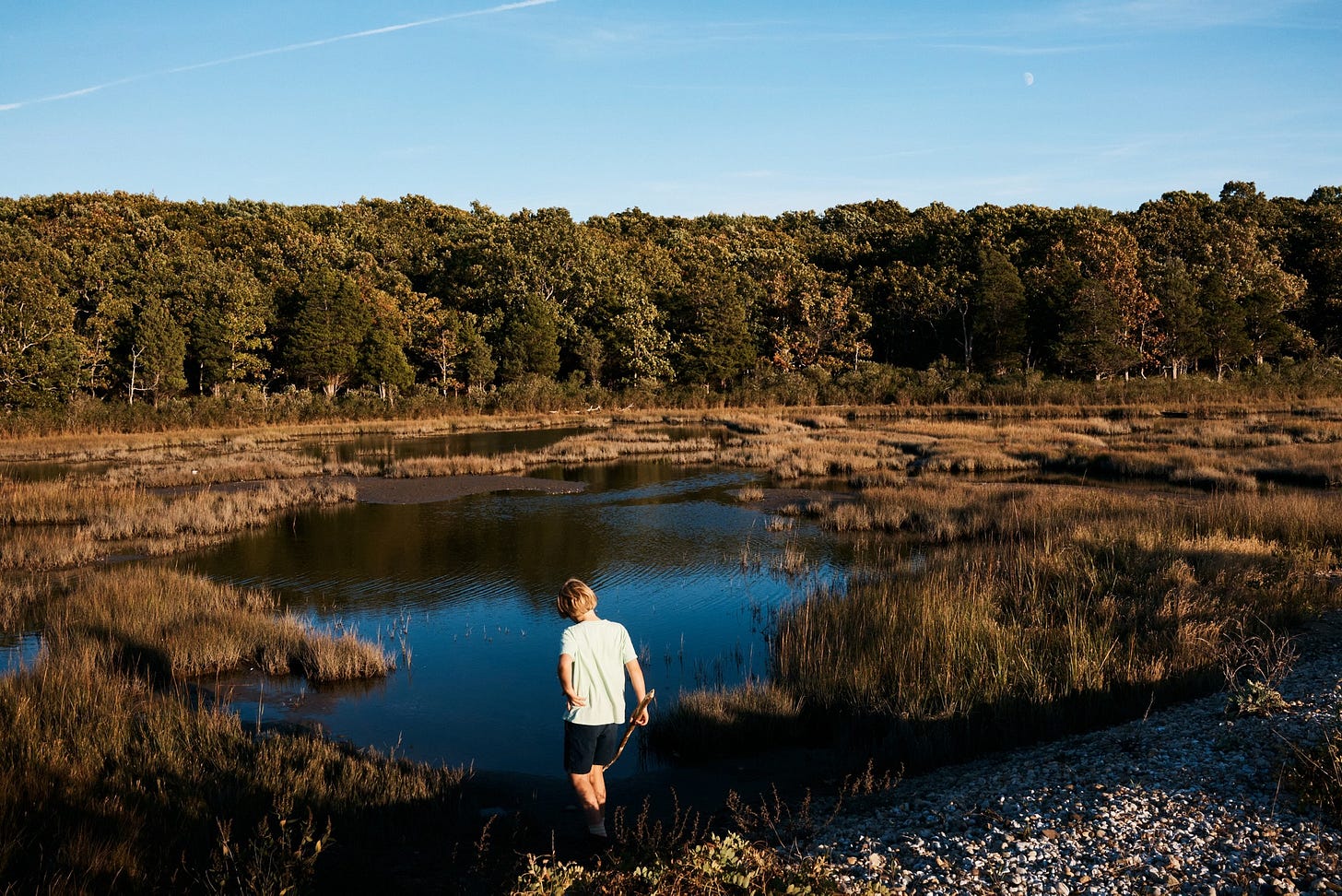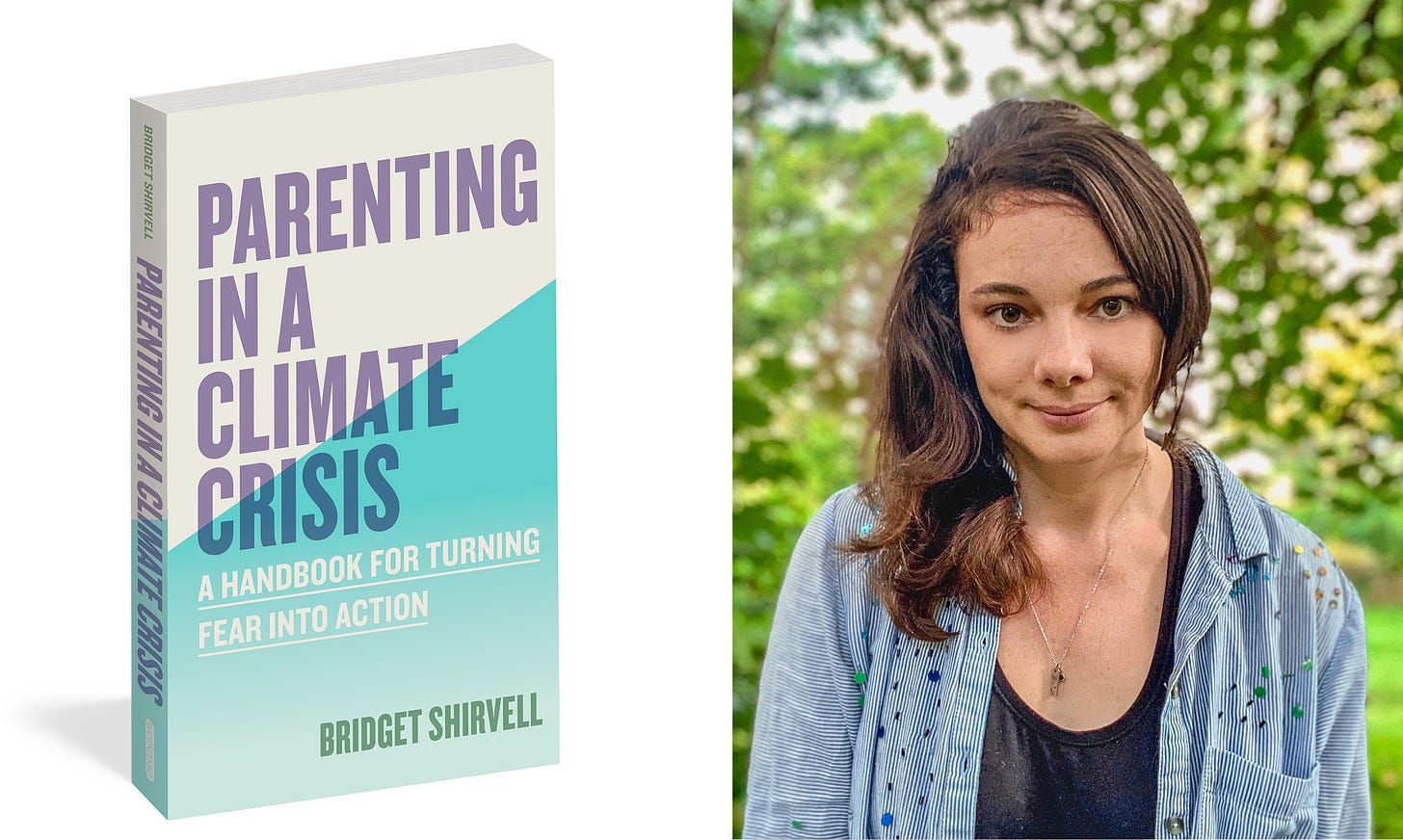Advice for parenting in the multi-crisis
Journalist Bridget Shirvell's new book is here to help
The news has felt like a lot in recent months, and especially in the last few weeks. But I think it’s been extra challenging for parents, who are (rightfully) scared about the future their children are inheriting. I got an early look at the new book Parenting in a Climate Crisis: A Handbook for Turning Fear into Action by journalist and mom
, which aims to help parents navigate the intersection of the climate/biodiversity/environment crisis and parenting. Reading the book, I found that much of the advice could also be applied to the other crises (social, political, economic) that our families face today.When Bridget and I spoke about the book, she revealed that the idea for the book came out of an article she pitched as a new mom. “It was 2019, and I had this idea of, ‘Can I climate-proof my child? What type of skills is she going to need?’” recalls Bridget whose daughter was only one at the time. “I was focused on things that you can teach like canning, making her own food, or sewing her own clothes. But through the course of reporting that article, it became clear that those skills are not what’s most important. It’s the skills around community building and how we nurture curiosity that are probably going to be most important.”
The book feels especially poignant in this particular moment, after recently witnessing the devastating floods in Appalachia and the historic wildfires in Los Angeles at the (with the dismantling of federal environmental protections going on in the background!). The climate crisis is here now. Even Bridget says the rapid escalation of the crisis has caught her by surprise. “I was really angry that it was already happening, that things are already getting this bad,” she says. “I thought that we would have a little more time.”
This book will appeal most to the parents of young children or those who have not yet been keenly focussed on the climate-parenting connection (which is apparently a lot of us: According to a 2022 report from Siena College that Bridget mentions in the book, only 49-percent of parents said they had talked to their kids about climate change, “despite the same report finding that nearly 8 in 10 Americans agree climate change is a ‘very’ or ‘somewhat serious problem.’”) Bridget’s calm, clear writing provides a gentle roadmap for anyone navigating these waters for the first time (I wish I’d had it when I first felt climate despair as a mom).
“Our kids’ lives and their world will be different, but that doesn’t mean it can’t be beautiful.” —Bridget Shirvell
Below I’m sharing a few big ideas from the book, but I encourage parents to pick up a copy: It’s such a valuable resource.
🎁 GIVEAWAY I’m also giving away one copy of Parenting in a Climate Crisis to one lucky reader. To enter to win it, you must be a paid subscriber and leave a comment below.
Here are a few ideas from Bridget’s new book:
Talk to other parents
Bridget offers clear age-appropriate guidelines for how to talk about climate change with kids, but perhaps more importantly, she encourages parents to talk to friends and particularly other parents about it. “When we talk about important issues, like the climate crisis, we help spread knowledge and build the foundation to take action together,” Bridget writes. When you do bring up climate with other parents, make it personal and share your feelings. I’d argue this is true for any kind of change we want to see in the world. For example, joining forces with other parents in my neighborhood to organize a fundraiser for a mayoral candidate, has been one of the things that’s giving me hope right now.
Resilience is everything
“Resilience is a buzzword that gets thrown around a lot these days, but what is it? What does it look like to be resilient?... and how can patients raise climate-resilient kids?” Bridget writes. To build resilience, she concludes, we need to be willing to let our kids take some risks, fail, and deal with the consequences. That doesn’t mean big risks, it can be as simple as letting kids play outdoors in an unstructured environment without parents hovering right nearby. Building will resilience in our kids will help them navigate the many crises they’ll face—not just climate.
Introduce kids to Nature
People are more likely to want to save the places, plants, and animals that they know, and this is especially true for children. But Bridget explains, knowing the natural world is also a way to build happiness and resilience that will help kids weather the stresses of our changing climate, and that’s true for parents too, as Bridget notes, “Helping children find joy in the natural world can be an antidote to climate grief.” I’ve personally found so much pleasure and inspiration in exploring nature with my kid. Two ideas for getting outside Bridget shares that I loved: Going on a child-led hike and scheduling time for being outdoors in your family calendar like any other activity.
Foster their curiosity
“To mitigate and adapt to the climate crisis, we will need to be deep thinkers,” writes Bridget (and ditto on the multitude of other crises we face). ”We need curious children who grow into interested adults.” So, admit to your kids when you don’t know something, and look for answers together. Ask them open-ended questions. Take your kids to the library to find books about their latest curiosities, like my kid’s obsession, yarn crafts. Travel together, or even just take a new route home. Pick a tree and visit it weekly. “The more curious we are about our neighbors, the trees outside or door, and where and how our clothes are made, the more willing we are to understand and empathize with others. Curiosity can help us build community,” Bridget writes.
Don’t dismiss individual action
A point that Bridget and I agree upon is that small actions have the potential to drive systematic change. Systematic change and individual action are not mutually exclusive, and individual actions can be valuable parenting tools. As Bridget writes, “Empowering our kids to know that they can have an impact as individuals is groundwork for raising kids who grow up to feel comfortable taking on the more systematic issues as activists or professionals or simply as voters.” (Bridget has a ton of ideas for individual actions families can take in the book.)
Focus on progress, not perfection
I asked Bridget if reporting the book had given comfort in any specific ways, and she said, “One of the things that made me feel better was people admitting that they screw it up—even though they're these climate change warriors. They still mess up at times and it's okay. They'll have conversations with their kids about mistakes, and why they happened. And maybe even why this is a systematic problem. That was something that made me be able to be a little more gentle with myself.” Remember that when you make less-than-perfect choices: We’re aiming for progress, not perfection.
You can pre-order Parenting in a Climate Crisis by Bridget Shirvell wherever books are sold including Bookshop.org and Barnes & Noble and through its publisher. You can also subscribe to Bridget’s newsletter Parenting in A Climate Crisis.
Parents and caregivers please chime in: How are you approaching parenting our kids in this unprecedented time? I’d love to hear in the comments below.
Related reading from the Living Small archive:
+ I wrote an essay about parenting in a climate crisis for SheKnows last April.
3 More Things
The best small space I saw last week was this little (506 sq ft!) house in Sydney. I love how architect Jennifer McMaster of TRIAS incorporated an interior courtyard in a very small house. More photos here and video here.
Not shopping: A group calling itself The People’s Union is calling for a “24-hour economic blackout” on February 28th to protest the government demanding rollback of diversity, equity, and inclusion initiatives. I don’t know if a single day of not shopping will make an impact, but I’ll still participate. Writer
also has a timely essay this week about shopping boycotts that I wholeheartedly endorse.On that note, I was so disappointed to read this article about REI in The Nation. I had no idea that REI “has made union busting standard procedure” and “faced dozens of unfair labor practices complaints.” I also wrongly assumed co-op = good, but REI is a consumer co-op—not a worker-owned co-op.
One last thing: Rag rug of my dreams!
Thank you for reading, friends. The news has been heavy (both globally and personally). In times like these, I often minimize what media I consume and when. If LIVING SMALL still makes your list, I am grateful.










Thank you for this, Laura! I grew up in a family where we talked about politics and the news a lot and I’ve struggled to find a way to consistently do that given how dark everything is. Appreciate being considered for the book.
Thanks, Laura! I have three teenagers and it’s been really interesting to be able to talk to them about world events now that they’re old enough to understand and have opinions.
I will say that this generation seems to be a lot more attuned to climate change, than, say, my parents’. It gives me hope for the future, but I’m also really struggling with frustration and anger because a lot of people don’t link rising costs with climate change. Our planet is a special place.